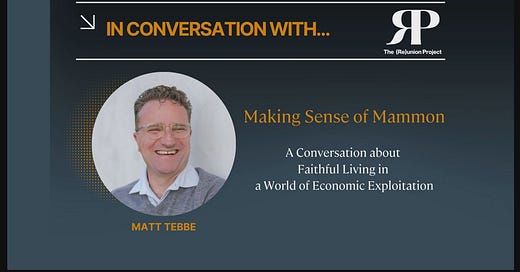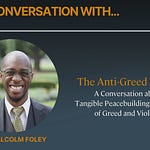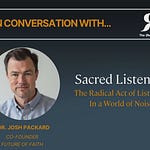(If you want to listen to the conversation outside of Substack, you can subscribe on Spotify, YouTube, or Apple Podcasts. Help us connect with more listeners by subscribing and leaving a review!)
Matthew 6:4 “No one can serve two masters. Either you will hate the one and love the other, or you will be devoted to the one and despise the other. You cannot serve both God and money (mammon).”
Discipleship calls us to abandon all other gods that call for our attention. Throughout scripture, it is clear that the god of mammon, or money, is a leading competitor of God for our loyalty and devotion. Jesus makes this abundantly clear: we cannot serve God and money. Yet, for much of the Christian church, especially in American Evangelicalism, little has been done to understand how we have been discipled economically. Much conversation has taken place about how to be good stewards of money, but rarely are we challenged to examine our economic assumptions and how they shape our daily lives and churches. It is difficult to show significant evidence that American Christianity has heeded the warning of Jesus and abandoned our service of money. What would it look like for the church to surrender our economics to the work of the Spirit and the Lordship of Jesus?
In this week’s conversation, Greg Arthur and Matt Tebbe explore the intersection of faith and economic ethics, particularly focusing on the concept of mammon and its implications for spiritual life. They discuss the journey of understanding economic exploitation, the spiritual power of money, and the importance of community in addressing poverty and injustice. The dialogue emphasizes the need for a reimagined economy that prioritizes human flourishing over profit, and the church's role in advocating for justice and equity in a world shaped by economic forces.
Resources Mentioned:
Gravity Commons - Matt’s organization, a new cohort on this topic starting soon
The Anti-Greed Gospel by Malcolm Foley
Asian Americans and the Spirit of Racial Capitalism by Jonathan Tran
The Politics of Jesus by Obery Hendricks Jr.
Jesus and the Politics of Mammon by Hollis Phelps
Episode Takeaways
The journey into economic awareness often begins with social justice movements.
Money is not spiritually neutral; it has a significant spiritual power.
We often spiritualize poverty, which can blind us to the realities of those in need.
The market is not a moral entity; it prioritizes profit over people.
Small acts of sabotage against mammon can help reclaim our values.
The Kingdom of God calls us to love and care for others, not exploit them.
Flourishing in community requires a shift in how we view economic relationships.
The good news of Jesus must resonate with those experiencing material need.
Understanding mammon helps us see the systemic issues in our economy.
Resources and community support are essential for navigating economic challenges.















Share this post